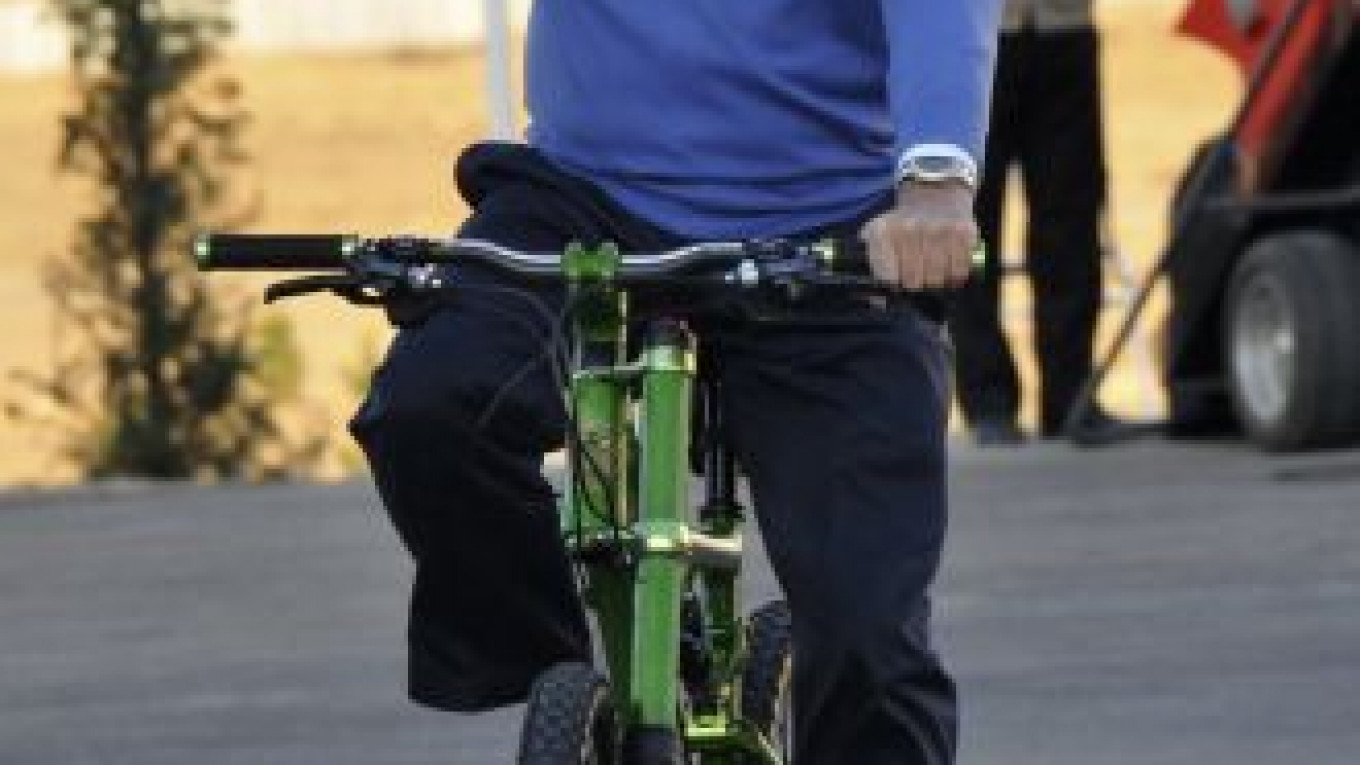ASHGABAT, Turkmenistan — Even for Turkmenistan's sports-mad leader, splashing out billions of dollars on building a sprawling "Olympic" town is a bold piece of extravagance.
This remote Central Asian desert nation, which has failed to pick up a single Olympic medal since gaining independence with the collapse of the Soviet Union, does not have much of a sporting pedigree.
Even so, the government of energy-rich Turkmenistan plans to spend $5 billion on completing the 157-hectare complex over three stages.
In a demonstration of his own physical robustness, 53-year-old President Gurbanguly Berdymukhammedov hopped on a bicycle and rode a horse during a recent foundation-laying ceremony.
Without referring directly to any specific plans for an Olympic bid, Berdymukhammedov predicted that Turkmenistan would one day host a major sporting competition.
"Sportsmen from all over the world will compete here in major international contests, and important successes will be accomplished," Berdymukhammedov said.
The Olympics might be a stretch, but the scale of the investment suggests that Turkmen authorities may be gearing up for an Asian Games bid.
Turkmenistan restricts its sporting passions mainly to equestrian sports — horses, and the national Akhal-Teke breed in particular, are venerated here — and wrestling.
The scale of the sports complex, dubbed by Turkmen authorities as the country's own Olympic town, is dazzling.
Over the first stage of construction, 30 sporting venues will be built, including a 10,000-seat hockey stadium, an indoor swimming pool, a cycling track, badminton and tennis courts, as well as a bowling alley.
Spacious indoor arenas will host gymnastics, wrestling, weightlifting, fencing and boxing events.
Authorities say the crowning glory will be a new 60,000-seat "Olympic" stadium spread out over 40 hectares.
A nearby athletes' village will comprise 20 apartment blocks able to accommodate up to 12,000 people and will be linked to sporting venues by monorail.
Berdymukhammedov's determination to forge a generation of sporting champions bears strong hallmarks of the nation's Soviet past. "In the future, the development of mass physical culture and sports will become one of our priorities," Berdymukhammedov said at the foundation-laying ceremony on Nov. 5.
Since coming to power, Berdymukhammedov has earnestly cast himself as a man of action, striking a stark contrast with his epicurean predecessor, President Saparmurat Niyazov, who died of heart failure in late 2006 at the age of 66.
Niyazov did sporadically attempt to instill his subjects with an understanding of the benefits of exercise. His most eye-catching practice was to lead his ministers and government workers on an annual eight-kilometer trek up the Walk of Health, a concrete staircase built into the hills overlooking the capital, Ashgabat.
But while officials trudged up the hill, rotund Niyazov reputedly took a helicopter ride to the summit, thereby undermining the entire purpose of the exercise.
Meanwhile, Berdymukhammedov is regularly shown in state media riding horses or partaking in martial arts sparring contests. In an apparent nod to Russian Prime Minister Vladimir Putin, he has also tried his hand at rally truck driving and flying a fighter jet.
The entire town is to be completed by 2016, but a glance at the medals table at the ongoing Asian Games in Guangznou, China, suggests the Turkmen coaches of the future will have little time to waste. As of Monday, almost halfway into the 20-day competition, Turkmenistan had yet to claim a single medal.
A Message from The Moscow Times:
Dear readers,
We are facing unprecedented challenges. Russia's Prosecutor General's Office has designated The Moscow Times as an "undesirable" organization, criminalizing our work and putting our staff at risk of prosecution. This follows our earlier unjust labeling as a "foreign agent."
These actions are direct attempts to silence independent journalism in Russia. The authorities claim our work "discredits the decisions of the Russian leadership." We see things differently: we strive to provide accurate, unbiased reporting on Russia.
We, the journalists of The Moscow Times, refuse to be silenced. But to continue our work, we need your help.
Your support, no matter how small, makes a world of difference. If you can, please support us monthly starting from just $2. It's quick to set up, and every contribution makes a significant impact.
By supporting The Moscow Times, you're defending open, independent journalism in the face of repression. Thank you for standing with us.
Remind me later.






